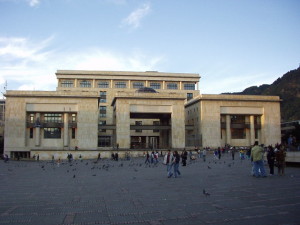Colombian Court Called into Question
$200,000 can buy a lot, including, allegedly, the vote of the President of Colombia’s Constitutional Court. Justice Jorge Ignacio Pretelt has been accused of asking the oil company Fidupetrol for $200,000 in exchange for promising to revoke a $9 million fine imposed on the company by a lower court. If convicted, this would be the largest corruption scandal in the court’s 24-year history.

Understandably, these accusations have “cast doubt on the transparency and honesty of the court,” according to the Inter-Institutional Commission of the Judicial Branch of Colombia. As a result, the other justices that sit on the court have requested the resignation of Justice Pretelt, who has refused to resign, telling the media that this scandal is a plot constructed by the Attorney General of Colombia, Luis Eduardo Montealegre to, “take over the court.” Pretelt insinuated that the Santos administration is attempting to remove him from power, and replace him with someone more ideologically aligned with the president’s liberal party.
It appears that corruption has reached even the highest rungs of the Colombian government and judicial system. Even the Attorney General himself is not free from scandal. In 2011, it came to light that SaludCoop, where Montealegre was a judicial advisor, illegally embezzled approximately $500 million in public health funds. Moreover, the Supreme Court of Colombia has been accused of attempting to suppress evidence in investigations of congressmen with alleged ties to the right-wing paramilitary group AUC. Laudably, the Accusation Commission of the Colombian House of Representatives, the government body responsible for investigating alleged crimes by top officials, including judges, has been implicated in numerous corruption scandals, such as violating electoral rules.
In response to these immediate corruption allegations, President Santos proposed a number of major changes to the court. The current process to become a justice in the Constitutional Court requires the President to provide a list of justices to Congress, which in turn makes a final choice from the list. Santos now proposes that the justices of the Constitutional Court be selected based on merit by fellow justices from a list provided by the president. Justices would be required to have 20 years of experience and would not be allowed to practice law for at least five years after retirement. These changes would not directly affect sitting justices, but according to Santos they would “break, once and for all, the umbilical cord between politics and justice, something which has caused a lot of damage.”
Additionally in response to questions of corruption, Santos proposed replacing the Accusation Commission with a so-called “super commission” that will have increased powers not only to investigate officials but also to suspend and dismiss corrupt officials. The members of this committee would be initially chosen by the president and later based on merit for a period of eight years. Ultimately Santos said “We cannot tolerate — and will not tolerate — the slightest hint of corruption from those who hold the highest positions in the justice system or any other branch of government.”
While President Santos is attempting to cut off the foot to save the leg, he must truly ponder if the cancer of corruption is contained in order to effectively rout out corruption. That said, these latest measures are likely to increase transparency and honesty among Colombian officials and judges.

